Full Text: China: Democracy That Works
4. Broad Patriotic United Front
The united front is an important structure through which the CPC earns popular support and pools strengths. In practicing people's democracy, the Party has always placed the united front in an important position, striving to achieve great unity and solidarity and balance commonality and diversity. The Party has made coordinated efforts to unite the other political parties, the non-affiliates, intellectuals who are not CPC members, members of ethnic minorities and religious groups, people working in non-public sectors, people belonging to new social groups, compatriots in Hong Kong, Macao and Taiwan, and overseas Chinese and returned Chinese nationals. It has combined all the forces that can be united and mobilized all positive factors to build a broad consensus, expand common ground, and achieve convergence of interests. In order to pool the wisdom and strength of the Chinese nation to the full, it has systematically promoted harmonious relations between political parties, between ethnic groups, between religions, between social groups and between Chinese people at home and overseas.
The CPPCC is an organization of the Chinese people's patriotic united front. It is composed of representatives from 34 sectors, including the CPC, the other political parties, the non-affiliates, people's organizations, ethnic minority groups and other sectors, compatriots from the Hong Kong and Macao Special Administrative Regions and Taiwan, returned Chinese nationals, and specially invited public figures. The First Session of the 13th National Committee of the CPPCC was attended by over 2,100 members, 60.2 percent of whom are non-CPC members. This demonstrates its important function as a center of unity and solidarity. It allows us to mobilize all positive factors and forces that cherish patriotism and support the CPC's leadership, and build a strong alliance for the rejuvenation of the Chinese nation by seeking common ground while setting aside differences.
5. The System of Regional Ethnic Autonomy
China is a unified multiethnic state. The CPC's ethnic policies are built upon the goals of forging a keen sense of national identity, maintaining territorial integrity and national unification, and achieving common development and prosperity through the joint efforts of all ethnic groups. The system of regional ethnic autonomy means that areas with large ethnic minority populations can practice regional autonomy, establish autonomous organs, and exercise the power of self-government under the unified leadership of the state. This basic political system is specified in the country's Constitution and its Law on Regional Ethnic Autonomy.
China's regional ethnic autonomy is autonomy under the unified leadership of the state. Territorial integrity and national unification are preconditions and foundations for regional ethnic autonomy, which combines unification with autonomy and ethnic factors with regional factors, and are thoroughly suited to China's realities. All ethnic autonomous areas are inseparable parts of the country, and all autonomous organs of these areas are local governments subject to the unified leadership of the central government.
Regional ethnic autonomy provides institutional and policy guarantees to ensure that ethnic minority citizens enjoy rights to equality and freedom, and to economic, social and cultural services. On all standing committees of people's congresses of the 155 ethnic autonomous areas, there are citizens from the local ethnic groups assuming the office of chair or vice chair; all governors, prefectural commissioners, and heads of counties of ethnic autonomous areas are citizens from the ethnic groups. The central government assists all ethnic minority areas in accelerating their economic and cultural development based on the characteristics and needs of the ethnic minorities there.
The system of regional ethnic autonomy has greatly increased the sense of pride and responsibility of people of all ethnic groups and stimulated their enthusiasm, initiative and creativity in jointly steering the course to a bright future. Under this institutional framework, communication and exchanges between ethnic groups, and socialist ethnic relations characterized by equality, unity, mutual assistance and harmony, have expanded. Ethnic unity has been reinforced, and a strong sense of national identity has been forged.
6. The System of Community-Level Self-Governance
Due to China's huge population and vast territory, there is great diversity in community-level governance. China applies a system of community-level self-governance represented by villagers autonomy, urban residents autonomy, and employees congresses. Under the leadership and support of community-level Party organizations, local residents directly exercise the democratic right to manage their own affairs by serving the community, undertaking self-education, and exercising public scrutiny. This effectively ensures that the people's rights are genuinely respected.
Villagers and urban residents exercise self-governance. Under the leadership of community-level Party organizations, residents in China's rural villages and urban communities establish villagers committees and residents committees, and directly exercise their democratic right to handle public affairs and public services in residential areas to which they belong:
•They hold democratic elections in which they elect villagers and residents committees.
•They conduct democratic consultation on local affairs in various forms.
•They practice democratic decision-making in handling community public affairs and public services through committee meetings and congresses.
•They carry out democratic management – they discuss and decide on their own rules on self-governance and codes of conduct and self-regulation, and run their affairs accordingly.
•They exercise democratic oversight – they elect village and urban community affairs oversight committees to supervise the handling of their community affairs and guarantee information disclosure.
As of the end of 2020, all the 503,000 administrative villages in China had established villagers committees, and all the 112,000 urban communities in the country had established residents committees.
Employees in enterprises and public institutions exercise democratic rights. Enterprises and public institutions practice a system of democratic management whose basic form is employees congresses, so that workers and staff can play an active role in decision-making on important matters concerning their immediate interests. They are implementing a system of employees serving as board directors and board supervisors. They have all employed a system featuring open access to enterprise affairs and are experimenting with practices that include open days to communicate with leaders, employee-employer consultations, and letters and messages to senior executives. These efforts are designed to mediate labor relations, listen to workers' voices, protect their lawful rights and interests, and collect complaints and suggestions on the operations, management and development of these entities. Corporate trade union committees are the operating mechanism of employees congresses. At present, there are 2.81 million primary-level trade unions in China, covering 6.55 million enterprises and public institutions.
Democratic innovations demonstrate great vitality. The Chinese people have explored and initiated numerous popular and pragmatic grassroots practices – residents councils, residents workshops, democratic discussions and hearings, courtyard discussions, neighborhood meetings, offline roundtables and online group chats. They have arranged for representatives of Party committees, deputies to the people's congresses, and CPPCC members to visit rural and urban communities. All these down-to-earth and pragmatic forms of democracy encourage people to voice their opinions and suggestions and conduct extensive consultation on matters related to their vital interests. This helps to coordinate the interests of multiple stakeholders, mitigate conflict, and maintain social stability and harmony at the grassroots level. Many successful grassroots experiences and practices have eventually turned into national policies, injecting new vitality into the development of China's democracy.
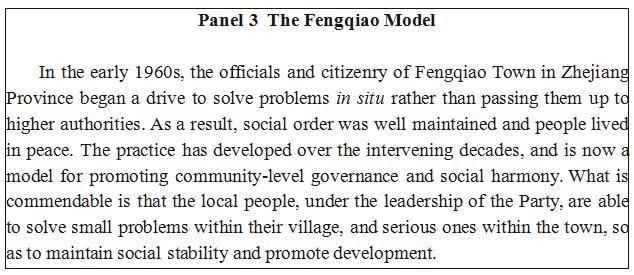
The system of community-level self-governance has strengthened the public's ability to understand and practice democracy, demonstrating that China's democracy is extensive and genuine. Community-level self-governance energizes all the "cells" of society. It makes grassroots governance more vibrant and efficient, and provides a solid institutional guarantee for a grassroots governance system in which responsibilities are shared and duly fulfilled, and achievements are enjoyed by all.
III. Concrete and Pragmatic Practices
Whole-process people's democracy in China is a complete system with supporting mechanisms and procedures, and has been fully tested through wide participation. China's whole-process people's democracy is a combination of electoral democracy and consultative democracy, and is applied through a combination of elections, consultations, decision-making, management and oversight. It covers the economic, political, cultural, social, eco-environmental and other fields, with a focus on national development, social governance and people's lives.
Whole-process people's democracy is a comprehensive and coordinated system involving extensive and regular participation, ensuring that the people's voices are heard and their wishes are represented in every aspect of China's political and social life. Whole-process people's democracy prevents individuals from manipulating the political process to win elections, and leaves no room for politicians to shower promises while campaigning and break them all once elected.
1. Democratic Election
By exercising their right to vote in elections, the people elect those who represent their will to hold and exercise power. This is an important form of democracy in China, and a clear demonstration of the people's status as masters of the country.
Elections in China are extensive and cover all aspects of the country's political and social life. They include elections to government institutions, villagers and urban residents committees, and employees congresses in enterprises and public institutions.
Elections in China are based on equality, and the people's right to vote and stand for election is fully guaranteed. Each person can cast one vote, and all votes are of equal value.
Elections in China are genuine and not manipulated by financial interests. Voters are free to vote for the candidates they trust.
Elections in China are progressing in a positive direction with the progress of the economy and society.
Elections to state organs. These include elections to the NPC and the local people's congresses at all levels, and those in which deputies to people's congresses elect leading officials of state organs at the corresponding levels. All citizens of the PRC who have reached the age of 18 – with the exception of those persons deprived of political rights in accordance with the law – have the right to vote and stand for election.
In accordance with the principles of universal suffrage, equal rights, multiple candidates, and secret ballot, deputies to people's congresses at the township and county levels are elected directly by the public. Deputies to people's congresses at the city, provincial and national levels are elected by people's congresses at the next level below. All deputies are elected for a term of five years. Leading officials of state organs at various levels are appointed or elected by people's congresses at the corresponding levels.
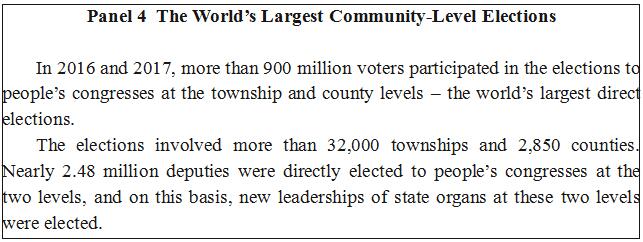
Community-level elections. Elections at the grassroots level are the most extensive and dynamic form of democracy in China. They include elections of villagers committees, urban residents committees, and employees congresses in enterprises and public institutions.
Villagers and urban residents committees are composed of chairpersons, vice chairpersons and members, and the elections are held simultaneously with those at the township and county levels.
Employees congresses – elected by all employees – are the bodies through which employees exercise their democratic management rights and make their own decisions in enterprises and public institutions.
China's democratic elections are adapted to the country's national conditions and stage of socio-economic development. Over recent decades, the Electoral Law of the National People's Congress and Local People's Congresses has been amended progressively. The ratio of deputy representation in people's congresses has been optimized – in 1953 there was an imbalance between urban areas and rural areas that gave urban residents eight times more representation than rural residents. By 1995 this ratio had fallen to 4:1, and by 2010 there was parity – urban and rural residents had equal levels of representation.
As the understanding of democracy has grown, so has the number of people participating in elections. Since the initiation of reform and opening up, China has held 12 direct elections to people's congresses at the township level and 11 direct elections to those at the county level, with a current participation rate of about 90 percent.
2. Democratic Consultation
Whenever a problem occurs, those concerned should always hold deliberations in good faith. Matters involving many people are discussed by all those involved; to reach the greatest common ground based on the wishes and needs of the whole of society is the essence of people's democracy. The Chinese people widely exercise their right to vote in elections and undertake extensive deliberations before major decisions are made. Democratic consultation is a special feature of democracy in China.
Democratic consultation has been established on the basis of solid cultural, theoretical, practical and institutional foundations. It derives from the best of traditional Chinese culture, including such ideas as aspiring for the common good, mutual understanding and inclusiveness, and seeking common ground while setting aside differences.
It comes from years of tenacious struggle by the Chinese people led by the CPC.
It originates from the political system created by all parties, organizations, ethnic groups, social groups and people from all walks of life since the founding of the PRC.
It also stems from China's continuous innovation in its state institutions since reform and opening up.
Democratic consultation takes many forms. In making and implementing decisions on major issues concerning reform, development and stability, and on matters bearing on the vital interests of the people, China conducts extensive consultations in all fields and at levels through various channels, including proposals, conferences, discussions, seminars, hearings, assessments, consultations, the internet, and opinion polls.
On matters that have a bearing on the interests of everyone, extensive consultations will be held throughout the whole of society; on matters that concern the interests of people in one specific region, consultations will be held locally; on matters that affect the interests of certain groups of people, consultations will be held among those groups; and on matters that concern the interests of a community, consultations will be held within the community.
The system of democratic consultation has improved. To promote the broad-based, multilevel and institutionalized development of consultative democracy, China has explored and expanded consultation channels to include consultations carried out by political parties, people's congresses, government departments, CPPCC committees, people's organizations, social organizations, and communities.
•The CPC and other political parties carry out consultations on major documents of the CPC National Congress and the Central Committee, the revision of the Constitution, the formulation and revision of major laws, the selection of candidates for state leaders, medium and long-term programs of socio-economic development, annual plan of socio-economic development, and major issues related to reform, development and stability, the united front, and multiparty cooperation.
•In exercising their functions and powers, people's congresses at all levels engage in deliberations with government departments, social organizations, experts and academics, and the general public.
•Governments at all levels, when performing their duties, strengthen communication with deputies to people's congresses, members of CPPCC committees, and representatives from the other political parties, the non-affiliates, people's organizations, social organizations, and all sectors of society.
•Under the leadership of the CPC, the CPPCC carries out extensive consultations and build consensus on matters concerning reform, development, and stability.
•People's organizations conduct consultations with relevant government departments on matters concerning the people's vital interests, especially those concerning the rights and interests of particular groups, and participate in consultations organized by the CPPCC.
•CPC organizations, government departments, and people's organizations for self-governance at the grassroots level, economic and social organizations, and local people deliberate over issues concerning the development of local communities and the vital interests of the people.
•Social organizations participate in or carry out consultations to better serve society.
With these seven consultation channels in place, China practices a rich and extensive form of democracy.
China draws on collective wisdom and promotes full expression and in-depth exchange of different ideas and viewpoints through democratic consultation. Parties to these consultations respect each other, consult on an equal footing, follow the rules, hold orderly discussions, stay inclusive and tolerant, and negotiate in good faith. In this way, a positive environment for consultation has been cultivated in which everyone can express their own views freely, rationally and in accordance with the law and rules. Through democratic consultation, China has built consensus and promoted social harmony and stability.
3. Democratic Decision-Making
Democratic decision-making is an important link in China's whole-process people's democracy. Reflecting the will of the people, sound decision-making ensures their rights and interests and improves their wellbeing. In China, the standard practice is to hear people's voices, act on their needs, and pool their ideas and strength. More and more ideas and suggestions of the general public are flowing directly to decision-makers at all levels, and they are increasingly reflected in the major decisions of the Party and the government.
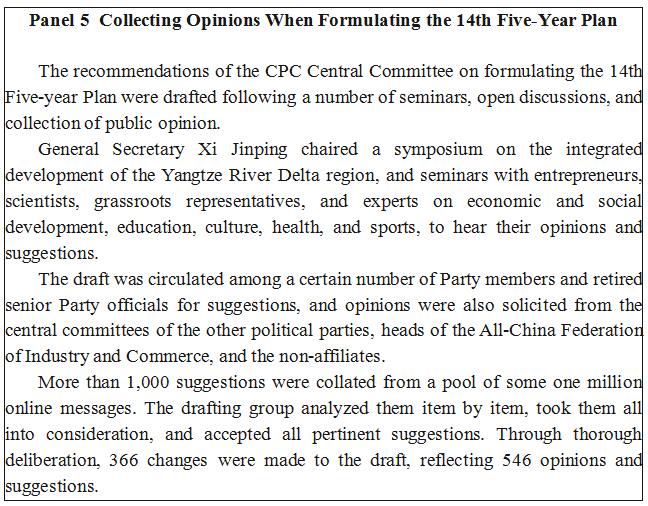
Open-door legislation by the NPC. People's congresses at all levels and their standing committees are committed to democratic lawmaking in the public interest. To reflect their will in lawmaking, the people's participation in legislative activities is guaranteed through various channels, an approach that has won wide public support.
When a piece of legislation is proposed, seminars, hearings and discussions are held to widely solicit public opinion, so that the people's will is reflected from the very first stage of legislation. When a law is being drafted, professionals and the public are both consulted, and now third parties are entrusted to draft laws and regulations on a trial basis. When a draft law is released, it is subject to public review from online channels and news media. Through local legislative information offices, people can participate in the drafting, research, revision, evaluation, and post-assessment of draft laws.
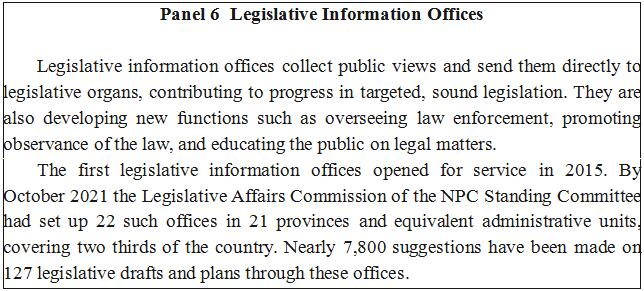
Transparent decision-making by the government. Governments at all levels hear the opinions and suggestions of all sectors on major decisions. Public participation in decision-making is ensured in various forms and through multiple channels.
At the beginning of the decision-making process, deputies to people's congresses and CPPCC members make suggestions and proposals, and citizens, legal persons, and other organizations can file written suggestions. During the decision-making process, opinions and suggestions are collected from all social sectors, and especially from those directly concerned, through formats including seminars, hearings, questionnaires, and field trips.
For public information, the draft decisions and relevant explanatory notes are available on government websites and media portals. In the last step, the final decision is made after group discussion based on the principle of democratic centralism. In post-assessment, public opinion is solicited once more, and deputies to people's congresses, CPPCC members, people's organizations, grassroots organizations, social organizations, and experts in various fields are invited to participate.
Grassroots decision-making. This happens in various forms of meeting among rural villagers and urban residents or their representatives, on a wide range of subjects such as the economy and society, infrastructure, social management, cultural services, eco-environmental conservation, the formulation of self-governance regulations, and other key matters in local governance. Rural villagers and urban residents also take part in carrying out the decisions they have reached.
4. Democratic Management
In China, the people manage their own affairs. They are the masters of the country and exercise their democratic rights accordingly, managing affairs of the state, the economy, culture, and society through various channels and in many forms.
Participation in the management of political and social life. The people exercise their rights and fulfill their obligations as prescribed by the Constitution. They participate in elections, consultations, decision-making, and oversight, and manage other areas of political and social life, fully enjoying their rights of information, participation, expression, and scrutiny.
Democratic management of urban and rural communities. As per the Constitution, relevant laws and regulations, urban and rural residents can set rules and conventions to govern their communities. Through discussion, they can decide residents' rights and obligations, the coordination rules and procedures between local organizations, and general principles for the collective economy, neighborhood security, fire safety, community sanitation, marriage, neighborhood relations, family planning, and activities concerning cultural progress. All urban and rural communities are run by their residents, who manage the public affairs and public services in their communities, exercise self-supervision, and seek to improve their lives.
Democratic management of enterprises and public institutions. With autonomy in their business operations and management, more than 150 million market entities are thriving across the country, providing job opportunities to over 700 million people, increasing China's national strength and promoting steady growth in economic and social wealth.
In accordance with the Constitution, relevant laws and regulations, enterprises and public institutions are run under democratic management through their employees congresses. The framework features disclosure of information on the affairs of enterprises, and systems for employees to serve on the board of directors and the board of supervisors. Under this framework, employees participate in business management, and protect their own legitimate rights and interests. In this way enterprises and their employees develop and maintain management mechanisms through consultation, and share the benefits they create.
A total of 3.14 million enterprises have established employees congresses, including 2.94 million private enterprises.
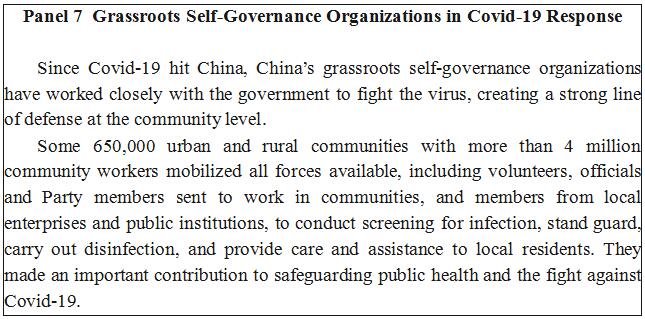
Democratic management of social organizations. Associations, foundations, social services and other social organizations formulate their own charters and exercise autonomy in managing their staff and activities. They address the concerns of their staff and clients, and hear their opinions. They participate in the governance of public affairs as appropriate to their role, and contribute to improving professional discipline, public services and charitable undertakings.
As of November 2021, more than 900,000 social organizations were registered with departments of civil affairs at all levels, including 2,284 with national networks. Diverse in form, social organizations have become an important area of people's democratic management in China.
5. Democratic Oversight
Comprehensive and effective democratic oversight enables the people to continue to exercise their democratic rights after elections, and ensures that there is an effective check on the exercise of power. In China, the abuse of power for personal gain is not eradicated by the rotation of ruling parties or separation of powers, but by sound, effective democratic oversight. Taking into consideration its own conditions, China has explored a coordinated system of oversight and established a well-defined, efficient supervisory network with clear functions and responsibilities. Supervision of power extends across every area and into every corner.
Supervision by people's congresses. People's congresses play their full role in overseeing the enforcement of the Constitution and laws, and the implementation of major decisions and plans. The people's congresses at all levels and their standing committees have strengthened their efforts to oversee judicial, supervisory and law enforcement work by the government, supervisory commissions, people's courts, and people's procuratorates, to ensure that laws and regulations are observed and that administrative, supervisory, judicial and procuratorial powers are exercised properly. The people actively participate in supervisory work of the people's congresses by various means such as forums of NPC deputies, meetings of people from the grassroots, questionnaires, online research, etc.
Supervision by non-CPC political parties. The CPC encourages the other political parties and the non-affiliates to exercise democratic oversight by expressing views, making criticism and giving advice as they participate in political consultation, conduct field work, take part in inspection and oversight of the implementation of major policies, decisions and plans of the Party and the state, and carry out targeted scrutiny over major issues as entrusted by CPC committees, while adhering to the Four Cardinal Principles – to keep to the path of socialism, to uphold the people's democratic dictatorship, to uphold the leadership of the CPC, and to uphold Marxism-Leninism and Mao Zedong Thought. The political parties, organizations, and prominent figures participating in the CPPCC can, in accordance with the CPPCC's charter, oversee in various activities organized by the CPPCC the implementation of major policies, decisions and plans of the CPC and the state by offering criticisms and suggestions. Their assistance to the CPC and the government in solving problems and improving their work increases solidarity.
Administrative supervision. The state administrative organs, in accordance with their statutory authority, procedures and methods, supervise their own operational and administrative acts. Different organs supervise each other, and conduct internal supervision from top to bottom and from bottom to top.
Oversight by supervisory commissions. Supervisory commissions perform their duties of supervision as provided for by the law. They examine the political conduct of public servants and supervise their exercise of public power and their fulfillment of professional ethics; they can also urge relevant organs and units to strengthen education, management and supervision of their staff.
Judicial supervision. The judicial and procuratorial organs, in accordance with their statutory purview and procedures, supervise the exercise of public power mandated by the people. Judicial supervision is the most forceful form of oversight of the CPC and the state; it is the ultimate "line of defense" to ensure lawful exercise of public power.
Auditing supervision. Auditing organs at each level inspect budget performance, audit the final accounts and the revenues and expenditures of the departments at their level and of lower-level governments.
Fiscal and accounting supervision. Financial departments are legally empowered to supervise the enforcement of laws, administrative regulations, and departmental regulations that govern fiscal and accounting affairs.
Statistical supervision. Statistical departments and relevant offices with statistical functions and duties supervise all organizations and personnel producing official statistics, to prevent and punish falsification, and ensure that statistical data are authentic, accurate, complete, and up to date, providing reliable reference for planning economic and social development.
Public supervision. Citizens, legal persons and other organizations supervise the performance of state organs and their staff. They can request administrative review, initiate administrative litigation, or file complaints or charges with supervisory organs against any misconduct or crime involving dereliction of duty, abuse of power, or violation of professional ethics.
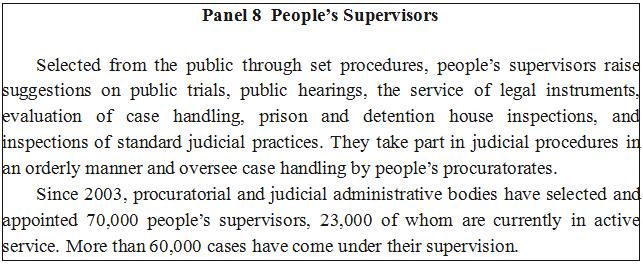
Supervision by public opinion. The media fulfill their supervisory role by representing public opinion, exposing in a timely manner abuses of public power, derelictions of duty, and acts of malfeasance. People are now relying more on the fast-growing internet and other platforms to offer criticisms and suggestions on the work of state organs and public servants at all levels. The internet is playing a bigger part in facilitating supervision by public opinion.
- Top legislature schedules standing committee session for late February
- China's top legislator meets with Uruguayan president
- Senior legislator surveys Anhui on formulating outline of provincial 15th Five-Year Plan
- China's top legislator meets with British PM
- NPC deputies see more engagement with top court



